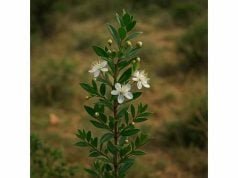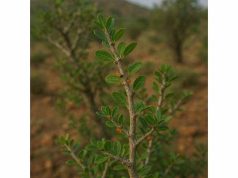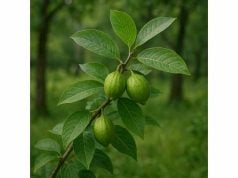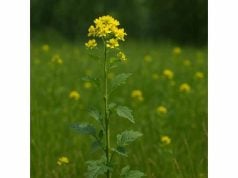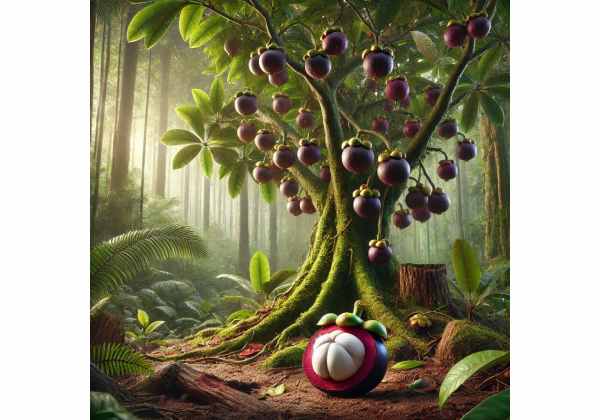
Mangosteen is a tropical fruit revered for its vibrant flavor, potent antioxidants, and impressive array of bioactive compounds. Celebrated in traditional medicine and increasingly validated by modern research, mangosteen is known to support immune function, reduce inflammation, and promote cardiovascular and digestive health. Rich in xanthones, flavonoids, and various vitamins and minerals, this exotic fruit not only tantalizes the taste buds with its sweet-tart profile but also offers a natural solution for overall wellness. Its diverse applications range from dietary consumption and nutraceutical supplements to cosmetic formulations, making mangosteen a truly versatile natural remedy.
Table of Contents
- Botanical Snapshot and Identification
- Phytochemistry and Bioactive Constituents
- Health Advantages and Key Qualities
- Applications and Safety Guidelines
- Research Discoveries and Pivotal Studies
- Frequently Asked Questions
Botanical Snapshot and Identification
Mangosteen, scientifically known as Garcinia mangostana, is an evergreen tropical tree native to Southeast Asia. This fruit-bearing tree is distinguished by its thick, deep-purple rind encasing succulent, snow-white segments. Typically thriving in humid, equatorial climates, mangosteen trees flourish in well-drained, fertile soils under the warm tropical sun. The tree itself is relatively small, reaching heights of 6 to 8 meters, and is admired not only for its luscious fruit but also for its ornamental value.
The leaves of the mangosteen tree are glossy, dark green, and elliptical, providing a striking contrast against the vivid fruit. Its flowers are small, yellowish, and appear in clusters, eventually giving way to the iconic round fruits. Cultivated extensively in countries such as Thailand, Indonesia, and Malaysia, mangosteen has been prized for centuries, earning the moniker “queen of fruits” due to its exquisite taste and health-promoting properties.
Historically, mangosteen has played a significant role in traditional medicine systems across Asia. Ancient healers revered the fruit for its purported ability to balance body energies and support overall vitality. The natural habitat of mangosteen, characterized by high humidity and rich organic matter, contributes to the fruit’s robust nutrient profile. In modern cultivation, careful propagation techniques ensure that the fruit retains its traditional characteristics while meeting global quality standards. Researchers continue to explore how environmental factors such as soil composition and microclimate influence the concentration of active compounds in mangosteen.
The botanical characteristics of mangosteen not only define its physical beauty but also contribute to its therapeutic potential. The dense, fibrous rind is a rich source of bioactive xanthones, while the delicate arils inside provide essential vitamins and minerals. These distinctive features have spurred both culinary innovation and scientific inquiry. As the global demand for natural health products grows, mangosteen remains a symbol of nature’s bounty—uniting ancient wisdom with modern nutritional science. Its balanced composition of nutrients and phytochemicals makes mangosteen a unique and powerful natural remedy with widespread appeal.
Phytochemistry and Bioactive Constituents
The exceptional health benefits of mangosteen are largely attributable to its complex phytochemical composition. Researchers have identified a range of bioactive compounds that work in concert to provide robust antioxidant, anti-inflammatory, and antimicrobial effects. Below is an exploration of the key active constituents present in mangosteen:
- Xanthones:
Xanthones are the hallmark compounds of mangosteen, with alpha-mangostin being the most prominent. These polyphenolic compounds are recognized for their potent antioxidant activity, which helps neutralize free radicals and protect cells from oxidative damage. Xanthones also exhibit anti-inflammatory and anticancer properties, making them a focus of numerous pharmacological studies. - Flavonoids:
Mangosteen contains a diverse array of flavonoids that contribute to its overall antioxidant capacity. These compounds work synergistically with xanthones to bolster the body’s defense mechanisms against oxidative stress. Flavonoids also support cardiovascular health by improving blood vessel function and reducing inflammation. - Tannins:
Tannins are naturally occurring polyphenols that provide mangosteen with astringent properties. In addition to contributing to the fruit’s distinctive taste, tannins have antimicrobial and anti-inflammatory effects. They help in stabilizing cell membranes and protecting against bacterial infections. - Phenolic Acids:
Phenolic acids, including gallic acid and ellagic acid, are present in mangosteen and play a significant role in its antioxidant profile. These compounds help reduce oxidative stress and may contribute to the prevention of chronic diseases such as cancer and heart disease. - Vitamins and Minerals:
Mangosteen is a natural source of essential vitamins such as vitamin C and several B-complex vitamins. It also provides minerals like potassium, magnesium, and calcium, which are crucial for maintaining metabolic balance, muscle function, and overall cellular health. - Essential Oils:
Trace amounts of essential oils in mangosteen contribute to its unique aroma and flavor. These volatile compounds also possess antimicrobial properties and may aid in digestive health by stimulating gastric secretions. - Dietary Fiber:
Although not a phytochemical in the strictest sense, the high fiber content of mangosteen aids in digestion and helps maintain healthy blood sugar levels. Dietary fiber also contributes to satiety, supporting weight management efforts.
The synergy among these bioactive compounds is central to mangosteen’s reputation as a natural powerhouse. Advanced analytical methods such as high-performance liquid chromatography (HPLC) and mass spectrometry have been pivotal in identifying and quantifying these constituents, ensuring that standardized extracts deliver consistent therapeutic effects. The interplay between xanthones, flavonoids, and other polyphenols underpins many of the fruit’s health benefits, from cellular protection to modulation of inflammatory responses.
This intricate phytochemical matrix not only defines the sensory qualities of mangosteen but also makes it a subject of keen interest in nutraceutical research. As scientists continue to unravel the molecular pathways influenced by these compounds, mangosteen’s potential applications in preventive health and chronic disease management become increasingly apparent. The fruit’s unique composition serves as a natural template for developing novel therapies that harness the power of nature to promote wellness.
Health Advantages and Key Qualities
Mangosteen offers a wealth of health benefits that have been celebrated in traditional medicine for centuries. Modern scientific research supports many of these claims, highlighting the fruit’s role in enhancing overall health and preventing chronic disease. The following outlines the core health advantages and essential qualities of mangosteen:
One of the most notable benefits of mangosteen is its extraordinary antioxidant capacity. The high levels of xanthones and phenolic compounds in mangosteen help neutralize free radicals, thereby reducing oxidative stress—a key factor in aging and the development of chronic illnesses such as cardiovascular disease and cancer. By protecting cells from oxidative damage, mangosteen contributes to improved cellular function and longevity.
In addition to its antioxidant effects, mangosteen exhibits powerful anti-inflammatory properties. Chronic inflammation is at the root of many health issues, including arthritis, metabolic syndrome, and neurodegenerative disorders. The bioactive compounds in mangosteen work to reduce the production of inflammatory cytokines, helping to alleviate symptoms and promote overall well-being. This anti-inflammatory action is particularly beneficial for individuals seeking natural alternatives for managing inflammation-related conditions.
Mangosteen also supports immune health by enhancing the activity of various immune cells. Its unique blend of antioxidants, vitamins, and minerals bolsters the body’s natural defense mechanisms, thereby reducing susceptibility to infections and aiding in recovery from illnesses. Moreover, the fruit’s antimicrobial properties help combat harmful pathogens, contributing further to its reputation as a natural immune booster.
Cardiovascular health is another area where mangosteen shines. Research suggests that the fruit’s active compounds can help improve blood circulation, lower blood pressure, and reduce levels of LDL cholesterol. This cardioprotective effect is essential for preventing heart disease and maintaining optimal vascular function. Additionally, the high fiber content in mangosteen supports healthy digestion and contributes to stable blood sugar levels, making it an excellent food choice for metabolic health.
The benefits of mangosteen extend to skin health as well. Its potent antioxidants and anti-inflammatory properties help protect the skin from environmental stressors, promote collagen synthesis, and reduce the signs of aging. Many skincare formulations now include mangosteen extracts to help combat wrinkles and maintain a youthful appearance.
Furthermore, mangosteen may aid in weight management. The fruit’s fiber content promotes satiety, reducing overall calorie intake, while its bioactive compounds support metabolic processes. These combined effects contribute to effective weight control and improved energy levels.
Overall, the comprehensive health advantages of mangosteen make it a versatile ingredient for enhancing wellness. Whether consumed as a fresh fruit, juice, or extract, mangosteen provides a natural means of boosting antioxidant defenses, reducing inflammation, supporting cardiovascular and metabolic health, and promoting radiant skin. Its multifaceted benefits make it a standout superfruit in the realm of natural medicine and nutrition.
Applications and Safety Guidelines
Mangosteen is celebrated not only for its potent health benefits but also for its versatility in both culinary and medicinal applications. Its sweet yet tangy flavor, combined with its impressive nutrient profile, makes it a favorite in smoothies, juices, and desserts, as well as a key ingredient in dietary supplements and natural health products.
Culinary Uses
- Fresh Consumption: Enjoy mangosteen as a whole fruit by peeling the thick rind to reveal its juicy, fragrant segments. Its sweet-tart flavor makes it an ideal snack or dessert.
- Juices and Smoothies: Blend mangosteen pulp with other fruits and vegetables to create refreshing beverages rich in antioxidants and vitamins.
- Salads and Desserts: Incorporate mangosteen pieces into fruit salads, yogurt parfaits, or chilled desserts for an added burst of tropical flavor.
- Culinary Fusion: Chefs are exploring mangosteen as a natural flavor enhancer in savory dishes, where its acidity and subtle sweetness can balance spicy and umami profiles.
Medicinal and Nutraceutical Applications
- Dietary Supplements: Mangosteen extracts are available in capsule, tablet, and liquid forms. These supplements are standardized to contain optimal levels of xanthones and other bioactive compounds.
- Functional Foods: The integration of mangosteen into health bars, teas, and snack products provides an easy way to harness its health benefits on a daily basis.
- Topical Formulations: Due to its antioxidant and anti-inflammatory properties, mangosteen extracts are increasingly used in skincare products such as creams, serums, and masks to combat aging and promote skin health.
Safety Guidelines and Dosage Recommendations
While mangosteen is generally recognized as safe for consumption, certain precautions should be taken:
- Start Slowly: Introduce mangosteen into your diet gradually, particularly when consuming supplements. This allows your body to adjust to the new bioactive compounds.
- Consult a Healthcare Professional: Individuals with pre-existing medical conditions, pregnant or breastfeeding women, and those taking prescription medications should seek professional advice before using mangosteen supplements.
- Quality Assurance: Choose products from reputable sources that adhere to rigorous quality control standards. Look for certifications or third-party testing to ensure product purity and potency.
- Monitor Reactions: As with any dietary supplement, be attentive to any adverse reactions such as gastrointestinal discomfort or allergic responses. Discontinue use if any negative symptoms arise.
- Avoid Excessive Consumption: While mangosteen is beneficial in moderation, excessive intake may lead to imbalances. Stick to recommended dosages as advised on product labels or by a healthcare provider.
By following these guidelines, you can safely integrate mangosteen into your daily routine, whether as part of a balanced diet or as a targeted supplement aimed at enhancing overall health. Its diverse applications—from refreshing culinary creations to potent nutraceutical products—underscore mangosteen’s role as a natural ally in the pursuit of holistic well-being.
Research Discoveries and Pivotal Studies
Scientific research has increasingly validated the traditional uses of mangosteen, shedding light on the molecular mechanisms behind its health-promoting properties. Numerous studies have focused on its antioxidant, anti-inflammatory, and anticancer activities, as well as its role in metabolic and cardiovascular health. Below is an overview of several key studies that highlight mangosteen’s potential:
- Antioxidant and Anti-Inflammatory Effects (2015):
A study published in the Journal of Agricultural and Food Chemistry evaluated the antioxidant capacity of mangosteen extracts. Researchers found that the high concentration of xanthones significantly reduced oxidative stress markers in cell cultures. The study concluded that mangosteen’s polyphenolic compounds play a crucial role in mitigating inflammation and protecting against cellular damage. - Anticancer Potential of Xanthones (2016):
In research featured in Cancer Letters, scientists investigated the effects of alpha-mangostin on various cancer cell lines. The study demonstrated that alpha-mangostin induced apoptosis in malignant cells and inhibited tumor growth, suggesting that mangosteen’s bioactive compounds may offer promising adjuncts to conventional cancer therapies. - Cardiovascular Benefits and Lipid Regulation (2017):
A clinical trial published in Phytotherapy Research explored the impact of mangosteen supplementation on lipid profiles and blood pressure. The findings revealed significant reductions in LDL cholesterol and improvements in overall vascular function, supporting the fruit’s potential in promoting cardiovascular health. - Metabolic Regulation and Glycemic Control (2018):
Research in the Journal of Medicinal Food assessed the effects of mangosteen on insulin sensitivity and blood glucose levels. The study reported that regular intake of mangosteen extracts improved metabolic parameters in subjects with type 2 diabetes, highlighting its role in glycemic control and metabolic health. - Skin Health and Anti-Aging Properties (2019):
A study in Cosmetic Dermatology evaluated the efficacy of mangosteen extracts in reducing signs of skin aging. The antioxidant and anti-inflammatory properties of the extract were found to enhance collagen synthesis and reduce wrinkle formation, affirming its use in natural skincare formulations. - Synergistic Effects in Nutraceutical Formulations (2020):
Recent pilot studies have examined the combined effects of mangosteen with other tropical fruits and herbal extracts. These investigations, published in Nutrients, indicate that such synergistic blends can amplify the antioxidant and anti-inflammatory benefits, paving the way for innovative functional food products.
Collectively, these studies provide a robust scientific foundation for mangosteen’s diverse health benefits. The integration of traditional knowledge with modern research techniques continues to enhance our understanding of how mangosteen’s bioactive compounds interact within the human body. As ongoing clinical trials and laboratory experiments further elucidate its mechanisms of action, mangosteen is poised to become an increasingly important component of both preventive and therapeutic health strategies.
Frequently Asked Questions
What is mangosteen and where is it grown?
Mangosteen is a tropical fruit native to Southeast Asia, known for its thick, purple rind and succulent white segments. It thrives in warm, humid climates with rich, well-drained soil and is widely cultivated in countries such as Thailand, Indonesia, and Malaysia.
What are the primary health benefits of mangosteen?
Mangosteen is renowned for its high antioxidant content, anti-inflammatory properties, and potential anticancer effects. It also supports cardiovascular and metabolic health, aids digestion, and promotes overall cellular protection thanks to its rich blend of xanthones and other polyphenols.
How can mangosteen be consumed safely?
Mangosteen can be enjoyed fresh, as juice, or in supplement form. While it is generally safe, individuals with underlying health conditions or those taking medications should consult a healthcare provider before beginning supplementation. It is best to start with small doses and monitor for any adverse reactions.
Are there any side effects associated with mangosteen?
Mangosteen is typically safe when consumed in moderation. However, some people might experience mild digestive discomfort or allergic reactions. If any adverse symptoms occur, it is advisable to reduce intake or consult a healthcare professional.
Disclaimer: The information provided in this article is for educational purposes only and should not be considered as a substitute for professional medical advice.
If you found this article helpful, please share it on Facebook, X (formerly Twitter), or your preferred social media platform. Follow us on our social networks for more updates on natural health tips and holistic wellness insights.

